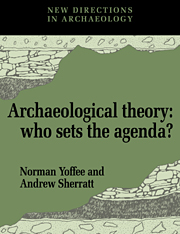Book contents
- Frontmatter
- Contents
- List of figures
- List of contributors
- Introduction: the sources of archaeological theory
- PART I THE SOCIAL CONTEXT OF ARCHAEOLOGICAL THEORY
- 1 Limits to a post–processual archaeology (or, The dangers of a new scholasticism)
- 2 A proliferation of new archaeologies: “Beyond objectivism and relativism”
- 3 Ambition, deference, discrepancy, consumption: the intellectual background to a post–processual archaeology
- PART II ARCHAEOLOGICAL THEORY FROM THE PALAEOLITHIC TO THE STATE
- PART III CASE STUDIES IN ARCHAEOLOGICAL THEORY AND PRACTICE
- PART IV EPILOGUE
- Index
3 - Ambition, deference, discrepancy, consumption: the intellectual background to a post–processual archaeology
Published online by Cambridge University Press: 03 May 2010
- Frontmatter
- Contents
- List of figures
- List of contributors
- Introduction: the sources of archaeological theory
- PART I THE SOCIAL CONTEXT OF ARCHAEOLOGICAL THEORY
- 1 Limits to a post–processual archaeology (or, The dangers of a new scholasticism)
- 2 A proliferation of new archaeologies: “Beyond objectivism and relativism”
- 3 Ambition, deference, discrepancy, consumption: the intellectual background to a post–processual archaeology
- PART II ARCHAEOLOGICAL THEORY FROM THE PALAEOLITHIC TO THE STATE
- PART III CASE STUDIES IN ARCHAEOLOGICAL THEORY AND PRACTICE
- PART IV EPILOGUE
- Index
Summary
A post–processual archaeology is, by the definition of its name, something that arises out of a processual archaeology. Post–processual archaeology itself is a reflection, in our own little discipline, of the larger post–modern movement that has so influenced academics and intellectuals in the 1980s; the “modern movement” in archaeology itself seems to have been provided, in large measure, by the American school of the New Archaeology, and by contemporary work in Britain. As post–processual has arisen both out of and against processual, so it has come largely to be shaped by processual habits – either to develop those manners further, or to turn against them. A great deal has been written about the character of post–processual archaeology, by the “pp”s themselves and now by their several critics; some of that debate is now conveniently brought together in Preucel's excellent edited collection (Preucel 1991), to which this book adds more. This paper therefore looks not at postprocessual by itself, but at four elements in the intellectual climate within archaeology of which post–processual is a part.
I chance to have been in the University of Cambridge, the place where the “p” versus “pp” argument has been most openly fought, at some busy periods: first as an undergraduate during 1970–73 when David Clarke held an intellectual initiative; and again from 1982 onwards, as a graduate student and in junior staff positions, in the era when “pp” has arisen there.
- Type
- Chapter
- Information
- Archaeological TheoryWho Sets the Agenda?, pp. 27 - 36Publisher: Cambridge University PressPrint publication year: 1993
- 7
- Cited by



